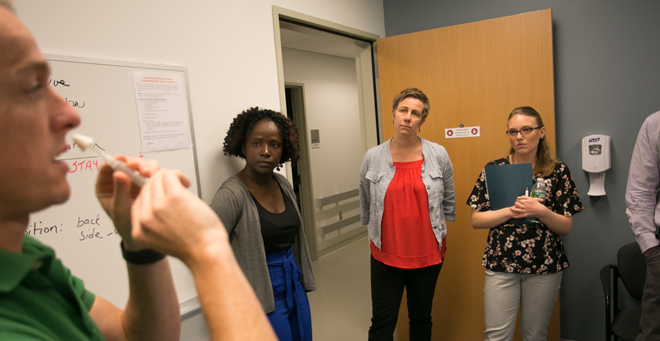 |
|
| Students participate in Opioid Safe-prescribing Training Immersion, known as OSTI, at UMass Medical School. |
UMass Medical School has been selected as one of four recipients of the Association of American Medical Colleges Curricular Innovation Award for its Opioid Safe-prescribing Training Immersion (OSTI) program.
In its award announcement, AAMC said the program “stood out as a stellar example of how AAMC member institutions are working to advance the education of students, residents and practicing physicians about opioids, substance use disorder and pain management.”
Jill Terrien, PhD, ANP-BC, associate professor in the Graduate School of Nursing, and Melissa Fischer, MD, MEd, professor of medicine, associate dean for undergraduate education, curriculum innovation and the Interpersonal Center for Experiential Learning and Simulation, said OSTI is a “tremendous example of interprofessional partnership across our institution.”
Along with colleagues from the Graduate School of Nursing and the School of Medicine, Dr. Terrien and Dr. Fischer were instrumental in creating the OSTI. Launched in 2016 in response to the opioid crisis, it is required curriculum for Massachusetts medical students and graduate nursing students that includes 10 core competencies for the prevention and management of prescription drug misuse. Core competencies include the ability to evaluate a patient’s level of pain and risk of addiction, various patient-centered treatment options, evidence-based pain management, and the appropriate use of medication-assisted treatment for opioid dependence.
Answering Gov. Charlie Baker’s call to better prepare health care providers to respond to the opioid epidemic, UMass Medical School worked with the other Massachusetts medical schools to develop the program. Quick to implement the strategy for both medical and nursing students, UMMS was the first medical school in the commonwealth to fully incorporate the competences into its curriculum.
Called a national model by Massachusetts Department of Public Health Commissioner Monica Bharel, MD, MPH, the program features a series of simulated clinical encounters with standardized patients, who are actors specially trained to portray a diverse array of patients. Five simulations represent the range of pain management needs frontline health care providers typically will encounter in their day-to-day clinical practice. Following the simulations, students meet with patients and families in recovery to hear their stories, ask questions and reflect on what they’ve learned.
UMMS will present the program at the May AAMC national workshop in Washington, D.C.